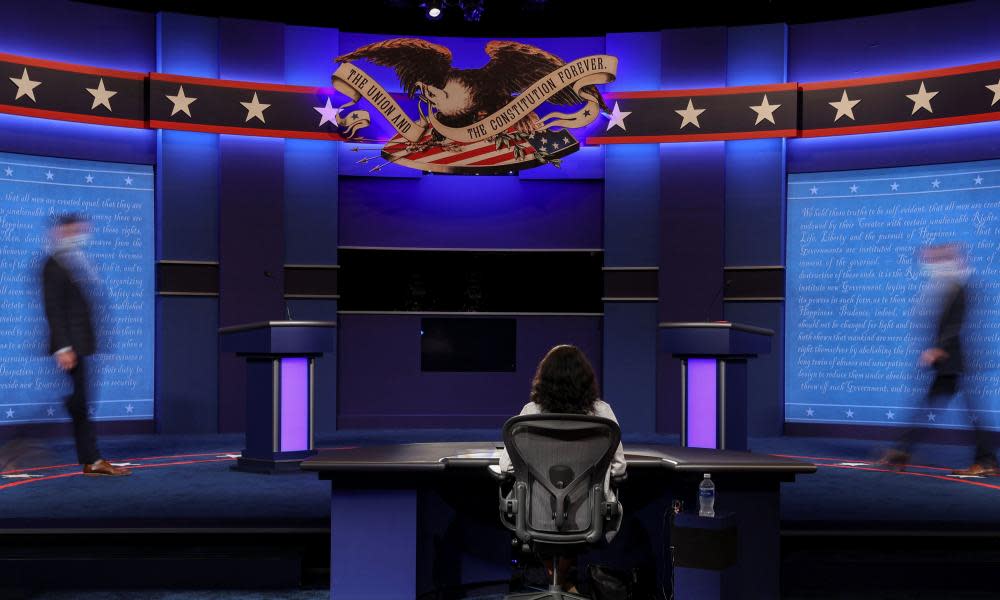Trump gets last chance to claw back Biden lead at final presidential debate
- Oops!Something went wrong.Please try again later.
- Oops!Something went wrong.Please try again later.

Donald Trump has his last chance to move the dial in the fast-approaching US presidential election on Thursday night, when he addresses a large nationwide audience at the final televised presidential debate.
Trump will face his Democratic rival Joe Biden at 9pm ET at Belmont University in Nashville, Tennessee. The candidates are expected to attract viewership in the tens of millions of Americans for their 90-minute encounter, giving the US president one last crack at shifting a race that has had him trailing the former vice-president for weeks.
NBC News and its moderator Kristen Welker will be hoping for a more civilized debate than the first, held three weeks ago, which collapsed into acrimony amid almost constant interruptions by Trump. In an attempt to prevent a repetition, the commission on presidential debates on Monday tweaked the format so that the candidates’ microphones are turned off while their opponent is speaking for the opening two minutes of each of six issue segments.
For the remainder of each of the 15-minute segments, discussion will be open between the two men.
Trump will be under pressure to soften his display compared with the first debate on 29 September, which was widely censured as bullying. Polls conducted after the debate suggested it damaged his already beleaguered standing in key battleground states such as Florida and Pennsylvania.
But there were few indications that Trump intends to change tack in the final hours leading up to the Nashville debate. On Monday he denigrated Welker as a “radical left Democrat”, while his campaign has accused the debate commission of being biased towards Biden and objected to the six policy subjects that NBC News has chosen.
They include three areas on which Trump’s record is especially vulnerable – race in America, Covid-19 and climate change – as well as national security, leadership and America’s families. Bill Stepien, Trump’s campaign manager, protested in a letter to the commission that this debate should have been on foreign policy, territory on which Trump thinks he can prevail following recent breakthrough agreements in the Middle East.
Trump has also been mired in his by now familiar angry denunciations of figures within his own administration and the media. Instead of making a closing argument to the American people, he has expended valuable political capital calling Anthony Fauci, the country’s top infectious diseases official, a “disaster” and “idiot”, and storming out of an interview with CBS News’ 60 Minutes.
The final debate falls at an increasingly anxious time for the Trump re-election campaign. National polls give Biden a steady and clear advantage, such as an 8.5% lead in the Real Clear Politics tracker.
National polls have limited value. More worrying for the Trump campaign is the fact that Biden has almost three times as much money to spend on the closing days as Trump, and is also showing an edge in key swing states.
An indication of the relevant concerns of each camp can be gleaned from where the candidates and their top surrogates will be travelling this week. Biden was hunkered down in Nashville for debate prep, suggesting that he sees the event as a chance for him to solidify his frontrunner status.
In support of Biden, Barack Obama travelled to Philadelphia on Wednesday making an appeal to African American residents to vote. Pennsylvania, which was central to Trump’s victory in 2016, is showing Biden ahead in the polls, but not enough for comfort.
Kamala Harris, Biden’s running mate, was in North Carolina on Wednesday, as was Trump himself. North Carolina, a traditional Republican stronghold, is seen as increasingly “purple” in that its changing demographics has put it up for grabs for either party.
Florida, which Trump must win if he is to have a solid chance at staying in the White House, is widely cast as too close to call.
Perhaps the most interesting campaign move was that of Vice-President Mike Pence, who was in Ohio. Trump took Ohio by eight percentage points over Hillary Clinton in 2016, but polls now suggest it is also too close to call.
The three scheduled presidential debates in 2020 have shaped up to be among the most volatile in US history. The second debate was cancelled after Trump contracted coronavirus and refused to stage the discussion through video links, resulting in dueling separate town hall meetings on different networks.

